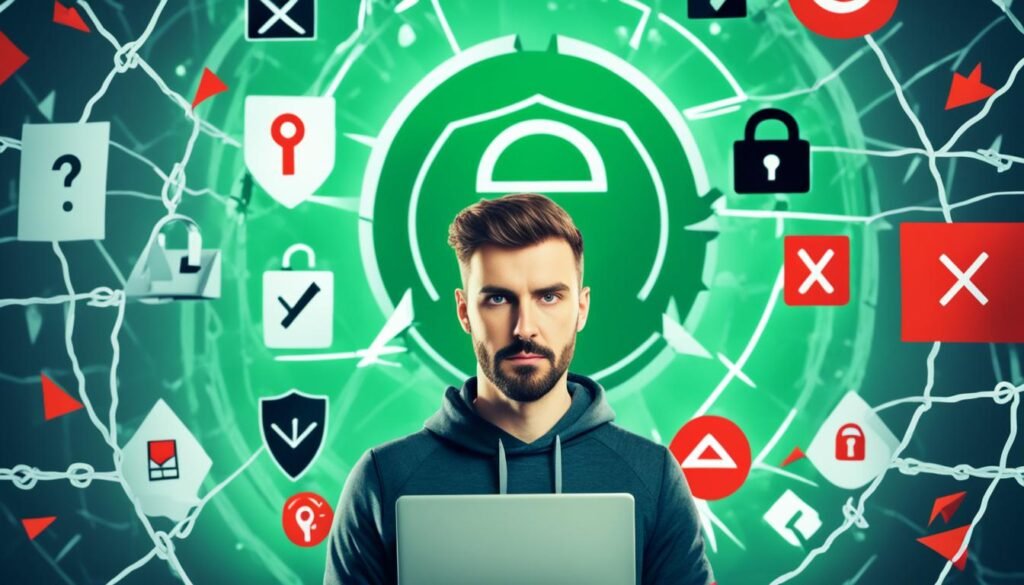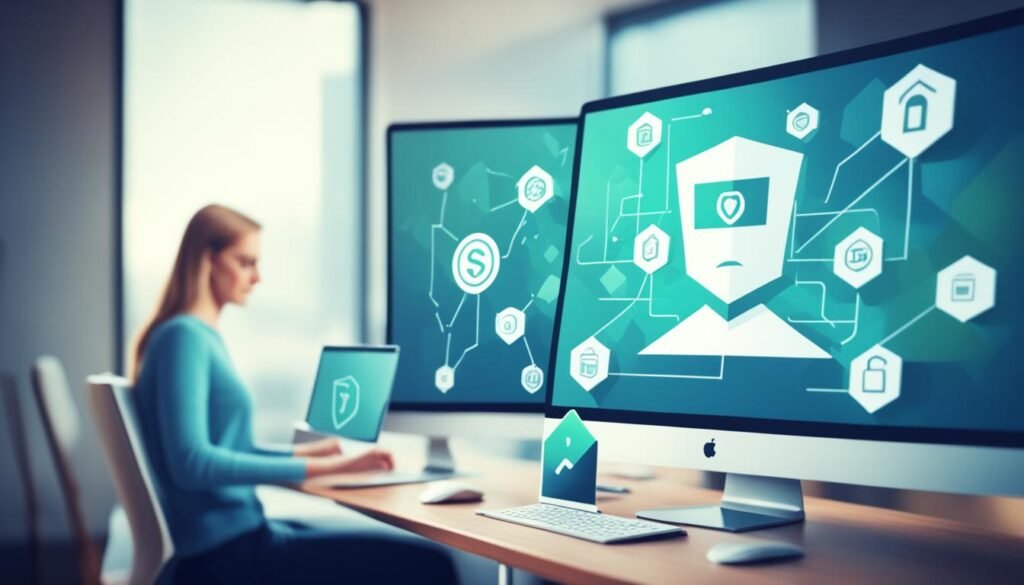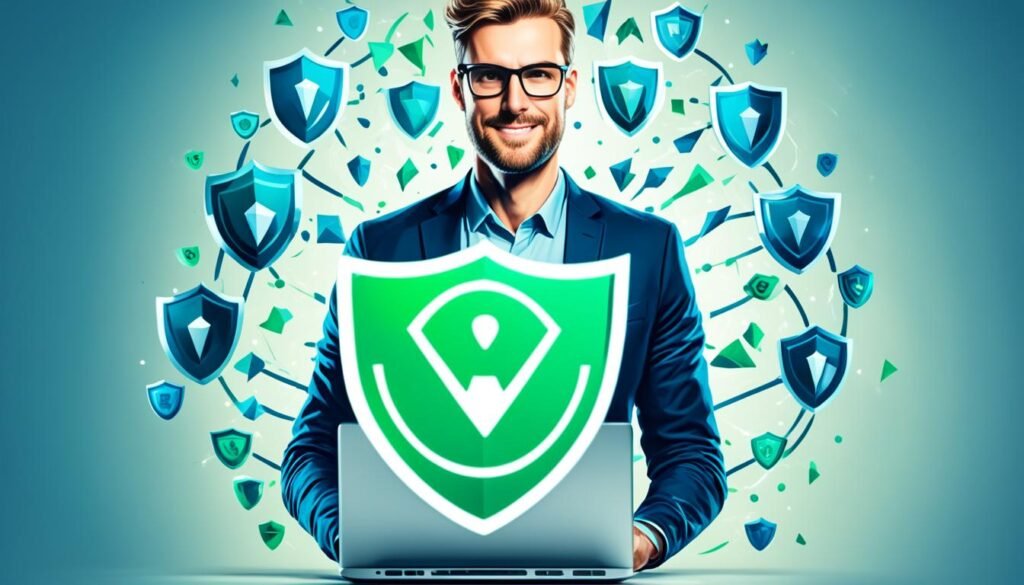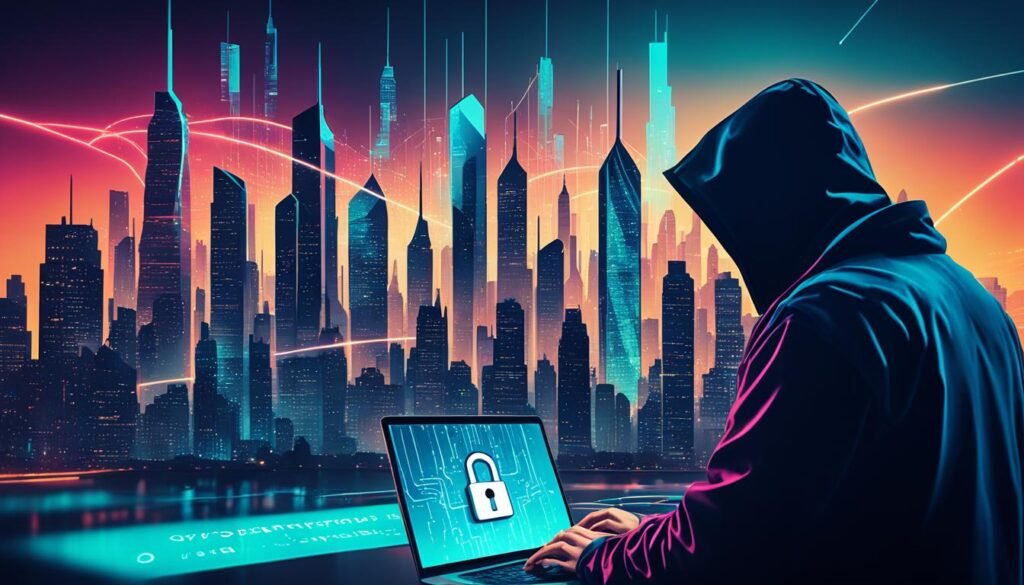Have you ever thought about how a simple tool can protect your online life and make your network better? That’s what a Virtual Private Network (VPN) does. VPNs offer big benefits for both people and businesses. They help keep your online connections safe, protect your data, and can even save you money.
For businesses, VPNs are key to keeping data safe from hackers and tracking. They make sure important info stays private. Plus, they let more employees work safely from anywhere without needing to expand the network. With 256-bit encryption, VPNs make your data unreadable, greatly boosting security.
For individuals, VPNs mean safer online chats, avoiding slow internet speeds, and getting past website blocks based on where you are. They keep your info safe on public Wi-Fi and help you dodge internet speed limits. Plus, VPNs are cheaper than hiring an IT team, saving businesses a lot on support costs.
VPNs are becoming a must-have in today’s digital world. They protect your personal data and make working remotely easier. The benefits are clear and wide-ranging.
As more people and companies see how important VPNs are, the question is: can you go online without one?
Enhancing Online Privacy with VPNs
In today’s digital world, keeping our online activities private is crucial. VPNs, or Virtual Private Networks, are becoming more popular as a way to protect our data and online habits. They offer strong security for our personal information. Reports show a big jump in VPN use worldwide, showing people’s growing need for safe internet.
Hiding Your IP and Browsing Activity
VPNs help keep our online privacy by hiding our IP addresses. This stops websites, ISPs, and others from tracking what we do online. They do this by sending our internet traffic through a secure server, hiding our real IP address. Also, 95% of VPN users say they feel less watched by ISPs thanks to strong encryption from VPNs.
- NordVPN offers advanced security like double VPN, making users more anonymous.
- Surfshark is affordable and lets users connect many devices at once.
- ExpressVPN has servers in over 90 countries, great for accessing different content.
Masking Your Real Location
VPNs also help hide where we are online. This lets us get to content and services blocked in our area. Studies show 90% of VPN users can get past location blocks, enjoying content they couldn’t see before. For 40% of remote workers, VPNs are key to safely getting into company networks.
VPNs protect our online actions and keep them private from hackers and ISPs. With these tools, we can surf the web safely and freely.
Ensuring Secure Remote Access
VPNs offer a key benefit by providing secure remote access. This is crucial for businesses with remote workers or teams away from the office. A VPN creates a secure link to the company network from anywhere with internet. It keeps company data and messages safe from hackers.
- Encryption Protocols: Using strong encryption like OpenVPN or IPsec in VPN setups keeps data safe and private.
- Two-Factor Authentication (2FA): Adding 2FA to remote access makes it much safer. It asks for more than just a username and password.
- Password Policies: Strong password rules with hard-to-guess passwords and regular changes help keep things secure.
- Security Updates: Keeping remote access software up-to-date helps fix security holes and protect systems.
- Role-Based Access Controls (RBAC): RBAC limits who can see sensitive data, cutting down on unauthorized access for remote workers.
Also, monitoring and logging tools watch and check remote access. They help spot and stop suspicious actions and security issues. Teaching remote workers about phishing, safe connections, and avoiding bad websites makes them more aware and secure.
Make sure remote devices have the latest antivirus, firewalls, and security tools to fight malware. Also, make Remote Desktop Protocol (RDP) security strong with good encryption, strict passwords, and limited access to keep RDP safe.
Regular checks and reviews of remote access systems help find ways to get better and improve security. These steps together make a strong and safe way for businesses to access things remotely, protecting data and networks.
Benefits of an Encrypted Network Connection
An encrypted network connection is key to keeping your online activities safe. It uses strong encryption like IPsec to protect your data. This keeps your sensitive info safe from hackers and cyber threats.
VPN technology is now trusted and works well with many networks. It gives strong protection on different devices.
Protecting Sensitive Data
Keeping your sensitive info safe is a big plus of an encrypted network. VPNs encrypt your data on public networks. This means your passwords, bank info, and personal details stay safe.
This encryption makes your data unreadable to hackers. It adds a crucial security layer. Plus, it lets employees work from anywhere safely, without needing to be in the office.
Safe Public Wi-Fi Use
Using public Wi-Fi safely is a big worry for many. Most people use public Wi-Fi at least once a week. So, it’s key to keep your data safe on these networks.
VPNs create a secure link on public Wi-Fi by encrypting your data. This stops others from listening in on your online activities. You can safely do things like online shopping and check work documents without worrying about data theft.
VPNs also stop your internet service provider from slowing down your internet. This means you can browse the web safely and without interruptions.
In summary, using a VPN with an encrypted network has many benefits. It ensures your data is sent safely and keeps public Wi-Fi use secure. This makes your online experience safer and more private.
Impacts on Online Privacy
In today’s digital world, keeping our online privacy safe is crucial. Virtual Private Networks (VPNs) are key to protecting this privacy. They encrypt all internet traffic, keeping sensitive data safe from others.
Avoiding Data Tracking
VPNs are vital in stopping data tracking. They hide your IP address and encrypt your online actions. This makes it hard for marketers and data brokers to follow your online steps.
Did you know over 2,200 cyberattacks happen every day? That’s one every 39 seconds. VPNs help protect you from these threats by hiding your data. Plus, 95% of digital breaches are due to human mistakes. Using a VPN greatly lowers these risks, keeping your online privacy safe.
Bypassing Advertisements
Many internet users dislike getting bombarded with ads. VPNs help avoid these ads by hiding your data that advertisers use. Without a VPN, your online actions are tracked, leading to more targeted ads. This not only annoys users but also risks their privacy.
By using VPNs, you can surf the web without ads. This makes your online experience better. VPNs also encrypt sensitive info like passwords and financial details, keeping you safe from cyber threats.
In summary, VPNs are essential for protecting your online privacy. They help prevent data breaches and keep your internet browsing ad-free. This makes your online experience safer and smoother.
Anonymous Browsing and Its Advantages
In today’s digital age, anonymous browsing is key for online privacy protection. Many think private browsing or incognito mode hides their online actions. But anonymous browsing hides your activity from ISPs, network admins, and websites, offering deeper privacy protection.
A VPN takes this anonymity further by encrypting all your traffic. This is more secure than proxy servers that offer less protection. VPN uses are vital for safe web use. They stop websites from tracking you with cookies, IP addresses, and web beacons. They also lower risks like cyberbullying, identity theft, and data misuse.
To improve your anonymous browsing, use privacy-focused search engines like DuckDuckGo. Clear your cookies and history often, and turn off third-party cookies. Choosing VPNs like NordVPN at $3.49/month for 2 years, or Surfshark at $2.29/month for 2 years, adds more security to your online actions.
Privacy-focused browsers like Brave and Tor send your web traffic through many nodes. This makes tracking you almost impossible. Even though they might be a bit slower, their anonymity is crucial for those who value privacy protection.
VPNs also hide your real location. They send your internet traffic through servers in different countries. This helps you get around web restrictions in places with strict censorship laws.
Using different privacy protection tools and setting up your browser and accounts right can really improve your online safety. Anonymous browsing with VPNs and other methods means you can have a safer and more private internet experience.
Methods for Bypassing Censorship

In today’s digital world, bypassing censorship is key. It lets users see all content and enjoy the internet freely. VPNs like PureVPN are great at this, offering secure and private browsing.
Accessing Geo-blocked Content
Many times, content is blocked by location to control info or protect rights. VPNs are great at getting past these blocks. They have over 6,000 servers in 65+ countries.
This lets users change their IP addresses and DNS settings. So, they can see content blocked in their area. Whether it’s a show on Netflix or news sites blocked at home, VPNs help you access it all.
Using Geo-spoofing for Online Freedom
Geo-spoofing hides your location by using an IP address from another area. Using VPNs for this makes it easier to see uncensored content and enjoy the internet freely. They use AES 256-bit encryption to keep your data safe.
Protocols like OpenVPN also make VPN traffic look like regular HTTPS. This helps get past government and other filters.
VPNs are super useful for anyone wanting to get past censorship and area blocks. They use geo-spoofing and encrypted connections. This lets users see lots of global content, making the internet more open and free.
Virtual Private Network Benefits for Secure Data Transmission
VPN security is key for keeping data safe. It uses encrypted connections to protect personal and work data from prying eyes. This keeps your information safe from hackers and others who shouldn’t see it.
When COVID-19 hit, big companies like Amazon and Google moved to remote work. This made VPN security more important than ever. VPNs help keep data safe as it travels, stopping hackers and malware in their tracks. This is crucial for keeping company secrets and client info safe.
VPNs don’t just keep data safe; they also control who can get in. This is great for remote workers who need to access company data securely. It helps keep company assets safe from outsiders.
VPNs also stop data from being slowed down or blocked. They encrypt data, making it hard for others to see. This means your data moves fast and safely, without interruptions.
VPNs make it easier to manage networks across different locations. They make it feel like you’re directly connected to the office, even when you’re not. This is key for businesses that need to work smoothly across many places.
In the end, using VPNs is a smart move for keeping data safe and secure. It helps protect against data breaches and unauthorized access. This is vital in today’s digital world.
Enhancing Remote Workforce Connectivity
More people are working from home, making VPNs key for secure access to company networks. VPNs help remote workers stay connected and productive. They make sure everyone can access important resources safely.
VPNs are a big part of keeping remote workers safe online. They encrypt internet connections, making it hard for hackers to steal company data. This keeps remote workers safe and lets them work from anywhere in the world.
For companies with remote teams, controlling network access is important. VPNs let companies decide who can get into the network and what they can do there. This keeps out people who shouldn’t be there and protects company secrets.
VPNs also make it easier for remote teams to work together safely. They make sure communication and sharing files are secure. This helps teams work well, even when they’re far apart.
Knowing about different VPN types helps businesses manage remote work better. Full tunnel VPNs send all internet traffic through a secure server for top security but might slow down the internet. Split tunnel VPNs let users choose what data to send through the VPN, balancing speed and security.
Microsoft shows how important a strong VPN is for remote work. With over 221,000 employees and many vendors, they handle over 200,000 VPN connections at once. Their VPN has a 92% success rate, making sure everyone can work safely and efficiently.
Reducing IT and Support Costs
Using VPN technology can greatly cut IT costs. It lets businesses hand over network upkeep and security to a VPN provider. This means less need for a big in-house IT team. It also cuts down on spending on hardware firewalls and intrusion protection software.
Cloud-based VPN support makes IT work easier and cheaper. It makes a company’s IT setup more efficient and sustainable. VPNs use strong encryption and the latest protocols for safe online activities. They meet security standards before connecting to the network.
The rise of remote work, especially during the COVID-19 pandemic, showed how important VPNs are. They keep connections safe between office servers and home devices. By using VPNs for remote access and SSL VPN and IPsec for data checks, companies can manage their networks better. VPNs are a smart and affordable way to keep networks secure, reducing IT and support costs.


